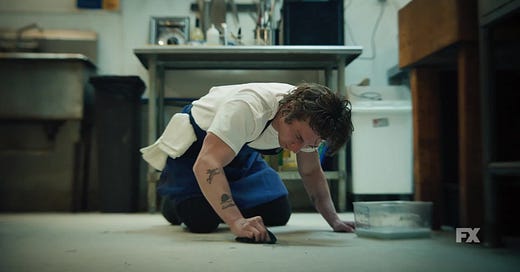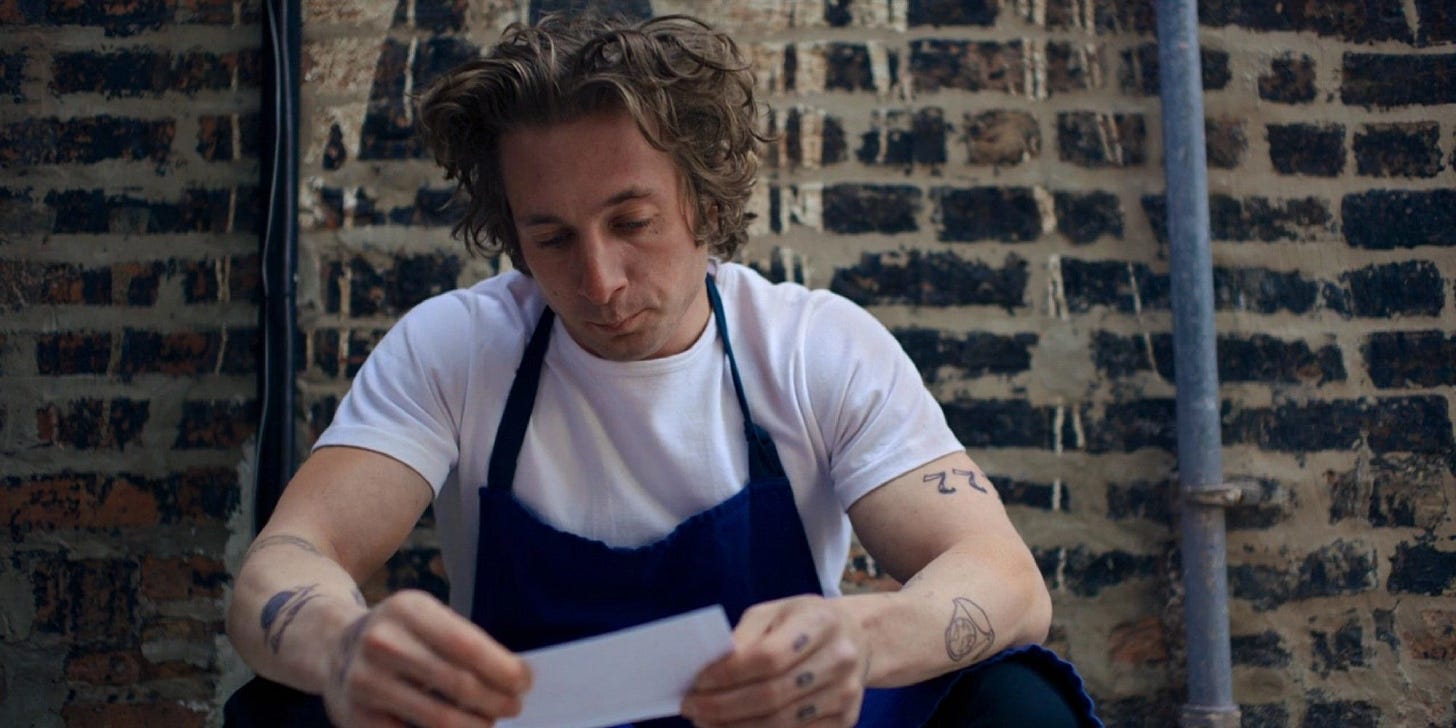We did it. We finally made television great again. Sort of. Not really. However, it’s easy to feel prematurely optimistic about the state of television when something as refreshingly great as FX’s The Bear comes along—more so if you’re anything like me and you haven’t been vaguely excited about a new television show in years.
The Bear is an incredible meditation on grief that is both heart-wrenching and endlessly hopeful. It follows genius chef, Carmen ‘Carmy’ Berzatto (Jeremy Allen White), whose rise to culinary heights in New York City is effectively derailed when he has to move back home to Chicago after his brother, Michael Berzatto (Jon Bernthal) commits suicide and Carmy inherits his sandwich shop, The Original Beef of Chicagoland (also known as The Beef for printed t-shirt making purposes). Throughout this stellar first season, we learn—as Carmy is also learning—that Michael was a man plagued by addiction and secrets which ultimately, in ways we never really get much clarity on, lead to his suicide. We watch as Carmy struggles to grieve a brother he is quickly realising he never really knew at all.
For years prior to Michael’s suicide, the Berzatto brothers had been estranged. In episode 8, Carmy points to the rift beginning when Michael, for reasons he never shares, stops letting him come to The Beef. This is particularly significant to Carmy because food/cooking had always been a sacred point of connection for the two brothers, so Michael cutting him off from this particular part of his life was hard to take. During this period of estrangement, Carmy becomes a remarkable professional chef in his own right. Becoming a chef, as Carmy himself admits, is a conscious attempt to ‘show’ his brother, so to speak. However, subconsciously, he just wanted to feel close to his brother through the one thing that had always connected them. Even in death, Carmy is still trying to connect to his brother through food by putting his entire energy into reviving The Beef. However, because his brother led a life littered with secrets, he finds this increasingly hard to do, particularly with each new thing he discovers about his brother, like how he owes the Chicago mob over a hundred thousand dollars or how, to supplement his income or lack thereof, Michael would occasionally sell drugs in an alley behind the shop. Not only are Carmy’s efforts to elevate The Beef being derailed by these revelations, his ability to properly grieve his brother is as well.
As I was watching The Bear, I found myself relating to Carmy quite a bit, in such a profound way that took me by surprise. Although not quite in the same sense, I too am familiar with grieving somebody I never knew. In August 1996, my mother was 4 months pregnant with me when my father died. Throughout my life I’ve had to constantly try to reconcile with this grief without a face. Unlike everyone else in my family, the loss of my father wasn’t something I could make sense of in any logical sense because even though in a very real way, I lost something–someone–when my father died, I never knew my father at all, so how do I begin to process the loss of someone I never really had? This is a question I’ve tried and failed to answer; a question that even The Bear can’t answer, not really at least. However, watching the show was a reflection of what I feel is the closest I’ll ever come to answering that question.
Growing up, we had this ghastly pine tree in our front yard that was clearly out of place in our neighbourhood. I always held an inexplicable fondness for this tree even before my mother told me the story behind it. The story, as my mother tells it, goes a little like this: In the early 90’s when my parents bought our house and had just moved in, my father worked at a hospital and outside this hospital they had just planted these little pine trees, so naturally my father thought it would be a good idea to steal one and replant it in the front yard. So one of the most tangible things my father left me—well, besides a place to live and my name, which he gave to me the second he found out my mother was pregnant—is this stolen tree. This tree was different than all those other things because for all intents and purposes, it was the most alive piece of my father I ever had; it grew as I grew, and every time I looked at it, I felt strangely connected to my father, to this man who by all accounts (my mother’s endless stories) is a man I think I would have really liked. Of course, it’s not really so much about the tree–which we’ve since had to cut down because it was taking up too much space and now instead of a tree, we have a weirdly empty yard and one more thing for me to grieve (which is incredibly bleak now that I think about it)–it’s about what the tree represents. This tree and the story behind it speak to a man who was incredibly odd and endlessly funny; a man who, despite never meeting, I feel a lot of kinship with. And that speaks to something that I felt that The Bear understood and reflected very well; the fact that death is one of life’s great unknowables, and that no matter the particular circumstance—whether your loved one died when you were still a mere foetus in your mother’s womb or if they died after a lifetime of loving and fighting with each other—death brings with it questions that often have no answers. The show understands that when we lose people we’re constantly longing to know them, perhaps more so in death than we ever did in life because after all, curiosity is a fundamental element of the human condition. We are constantly searching for the why because there is arguably nothing scarier about existence than the absence of rhyme or reason. And whilst The Bear understands this, it does not set out to offer any answers, particularly about the circumstances surrounding Michael’s death–it lives in the murkiness of uncertainty that death often brings.
One of my favourite moments in the show is when after episodes of Carmy questioning everything about his brother, particularly why he killed himself and left him The Beef, Richie (Ebon Moss-Bachrach) gives him a note from Michael that he had found episodes prior but had initially decided to keep from Carmy because he feared that its contents would send him into an emotional spiral. The existence of this note represents the promise of answers and closure, both to Carmy and the audience; however, things are never that neat and tidy on this show. What Carmy finds written on this note are three words that answer everything and nothing at all: “Let it rip”. These words are familiar to Carmy because these are words that his brother used to say to him all the time, words that mean ‘I love you’ and ‘give them hell’. These words connect Carmy to his brother in ways nobody else can really understand and it is with these words and this particular moment that the show settles on a single truth about grief; that grief is ultimately an act of re-connection. And that is what resonated with me so profoundly when watching this show because despite very little actual parallels between Carmy’s loss and my loss, the aforementioned is an almost universal truth about grief that applies to both situations. Just as Carmy is doing by holding on to The Beef and turning it into something his brother never had the chance to–a symbol of love and family–I too am constantly reconnecting with my father through the little pieces of himself he left for me. That is how I grieve for this man I never even knew, by getting to know him and holding on to the things that connect us.
It’s such an incredibly (and surprisingly) hopeful outlook on death and grief, this idea that in death lies the opportunity to re-tether ourselves to those that we’ve loved and lost. This idea that these connections don’t cease to exist or even remain constant when someone dies, but instead they grow and change every single day because that person still lives on in our memories, and in the trees and in sandwich shops.
A few parting words:
Please watch this show.




